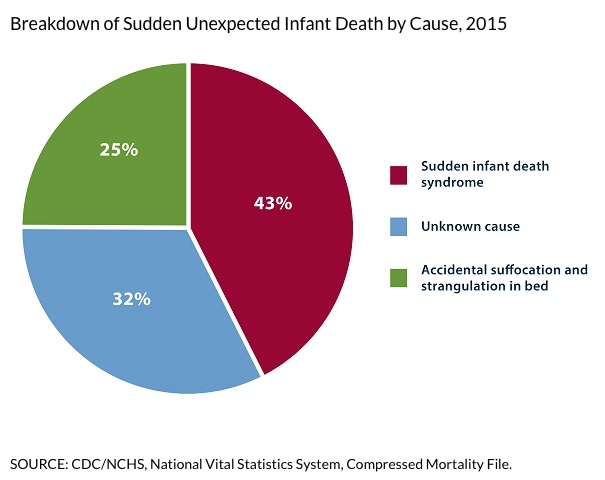
The equation for the latest way to protect newborns from sudden infant death goes as follows:
Technology + Smart, Practical Thinking = Greater Safety
Credit doctors and nurses from three university medical schools for developing an ingeniously straightforward method that reinforces essential child care methods for sleep-deprived parents – at a time when they're most prone to overlook them. Specifically, these professionals determined, as stated in a news release announcing the findings, that a "series of educational videos delivered by text or email successfully encouraged new mothers to use safe sleep practices for their babies, reducing the risk of sudden infant death," otherwise known as SIDS.
Timely reminders arriving via smartphone. In the middle of the night. Brilliant.
The theory going in was that mothers are made aware of how to best protect their new arrivals from SIDS, but when it actually comes to implementing those safety practices while in a sleepy stupor, as my colleague pointed out last summer, that's when dangers arise. So researchers developed a "mobile health program" that delivered safety reminders and proper care techniques to mothers' phones – at the time they needed to be reminded – which "significantly improved compliance" regarding the essential recommendations in four areas of care:
- supine sleep position (infant face up, lying on its back)
- sleeping in the same room as the mother, without sharing the same bed
- no use of any soft bedding, or soft mattress
- using a pacifier
Citing results from the randomized, controlled clinical trial, published in the Journal of the American Medical Association, the researchers found:
- "mothers receiving the safe sleep mobile health intervention had higher prevalence of placing their infants supine compared with mothers receiving the control mobile health intervention (89.1% vs 80.2%, respectively)"
- "room sharing without bed sharing (82.8% vs 70.4%)"
- "no soft bedding use (79.4% vs 67.6%)"
- "any pacifier use (68.5% vs 59.8%)"
"[M]any parents worry about their baby choking when they're on the back. Therefore, we sent them a video showing them that this is not true," said Rachel Moon, MD, from the University of Virginia Schools of Medicine and Nursing, which partnered with the Schools of Medicine from Yale University and Boston University. "A lot of parents can be overwhelmed when caring for a new baby, partly because they are not sure what to do or get different advice from different people. We think that the videos and support that we provided in the texts and emails helped to give parents the information that they needed when they needed it and also addressed common concerns many parents have."
 In 2015, in addition to 1,600 fatalities attributed to SIDS – defined by the CDC as "sudden death of an infant less than 1 year of age that cannot be explained after a thorough investigation is conducted" – there were also 1,200 deaths with an "unknown cause" and another 900 "due to accidental suffocation and strangulation in bed," bringing the total to 3,700 for that year. In 2014, when 3,500 deaths were recorded, 90% occurred before the age of 6 months.
In 2015, in addition to 1,600 fatalities attributed to SIDS – defined by the CDC as "sudden death of an infant less than 1 year of age that cannot be explained after a thorough investigation is conducted" – there were also 1,200 deaths with an "unknown cause" and another 900 "due to accidental suffocation and strangulation in bed," bringing the total to 3,700 for that year. In 2014, when 3,500 deaths were recorded, 90% occurred before the age of 6 months.
As for the study, it was based on survey information provided by 1,263 mothers in 16 hospitals, all of whom provided written informed consent. (This participation group was derived from an initial pool of 1,600 mothers, 100 from each of the hospitals.) Among the requirements, all mothers had to speak English, live in the United States and were able to receive daily emails and texts.
"The messages and videos were timed to address challenges and questions that arise at specific time points; therefore, providing this additional information to parents at critical times may have been important in assuaging concerns about adherence to recommended practices," the authors wrote.
"Furthermore, receiving frequent videos and email or text messages may have served as a virtual support system for mothers, reinforcing safe parental practices," and that, they continued, "interventions for multiple health issues have found that messages tailored to clinical situations and sent on a daily to weekly basis are associated with positive effects."
One of the study's limitations acknowledged by the authors was that those not responding to the survey were "predominantly younger, black, single, and less well educated, which are all factors typically associated with higher rates of non-adherence with safe sleep recommendations." Another was that respondents were only English speakers, meaning the results can not be applied to other populations. And finally, self-reported data has its own built-in limits.
These researchers say that in the future they're hoping to expand the scope of the study to a larger pool of participants, and to improve the quality and impact of the late-night messaging.



